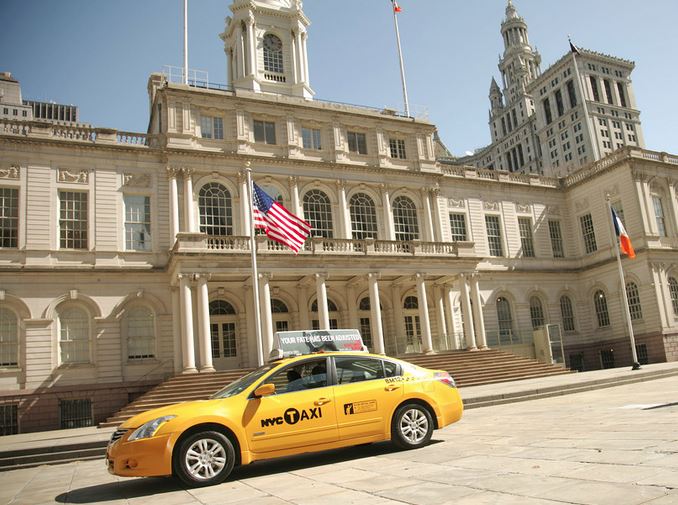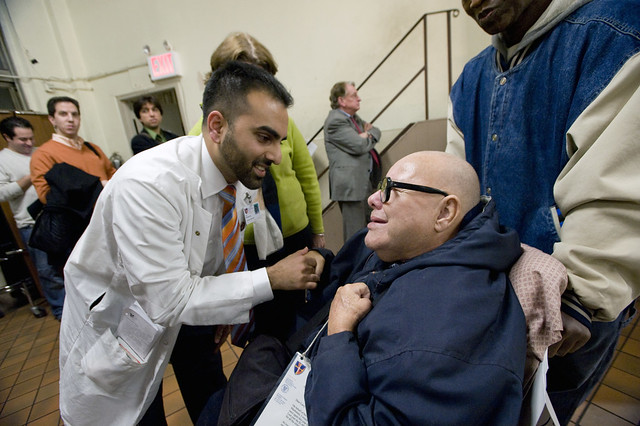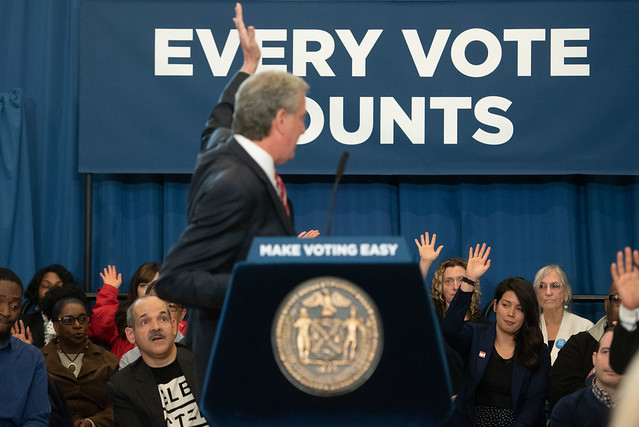Taxi Medallion Exposé Drives Home Key Budget Lesson

(Photo: Ed Reed/City Council)
Last week, the New York Times published another blockbuster investigative series by reporter Brian Rosenthal, this time on the misleading and predatory practices which led to inflated prices of New York City yellow taxi medallions over the last decade.
The compelling stories of taxi drivers who thought they were buying into the American dream by purchasing taxi medallions, only to find their incomes drastically reduced by the competition of Uber and Lyft, has been a topic of public discussion for some time, but Rosenthal’s reporting provides new and detailed documentation of how lenders and brokers drove up the prices and encouraged purchases without concern as to whether the buyers had the wherewithal to repay their loans.
The story is reminiscent of the over-leveraged home buying encouraged and condoned by financial services firms and banks that contributed to the national housing bubble and the recession in 2008.
In his second article on the taxi industry, Rosenthal focused on the regulatory agencies that seemingly should have known something was wrong when medallion prices skyrocketed but did nothing to intervene. Indeed, the New York City Taxi and Limousine Commission even ran ads promoting medallion sales as a great investment. State and city officials are now investigating; legislators are looking at ways to aid struggling medallion owners.
The situation of many taxi drivers and their families (especially those who have died by suicide) is unspeakably sad and it is understandable that elected leaders want to help them. But the rise and fall of taxi medallion prices also contains a larger message and lesson for government about the dangers and unintended consequences of relying on one-time revenues to fund government expenses.
Fiscal watchdogs warn against reliance on “one-shots” because they artificially inflate the amount of revenue available and will have to be replaced by other resources over the long term. That is why organizations like Citizens Budget Commission (CBC) urge that one-time windfalls be used to pay down debt or bolster reserves, not to start new programs or pay for employee salaries and benefits.
CBC has repeatedly criticized the city for including large amounts of anticipated taxi medallion sales revenue in its financial plans since it began doing so in 2011:
“Balancing the budget with these one-shots does not address the structural problems– notably, escalating health insurance and debt service costs—but masks the problem temporarily and delays the discourse needed to adopt more enduring, if politically tougher, solutions. In addition, one-shots can be unreliable; if something does not work as anticipated, the savings will not materialize.”
The same concern holds true for one-shots at the state level. New York state government has received over $11 billion in one-time revenue from settlements of litigation with financial institutions over the past five years. This funding has been used for a variety of initiatives, from infusions into economic development schemes like the “Buffalo Billion” to front end development and construction costs of the Mario M. Cuomo Bridge. Regardless of the merits of these projects, it would have been more prudent and appropriate to use these one-time revenues to reduce the state’s indebtedness and/or increase its rainy day reserves to be better prepared for the inevitable time when there is an economic downturn.
And Rosenthal’s investigation highlights another reason for avoiding reliance on one-shots: not only do they obscure the city’s true fiscal picture but they can create pressure on officials – albeit sometimes unintentional or even unconscious – to maximize resources to fill a budgetary need.
The city has repeatedly included as much as $1.5 billion in taxi medallion sales revenue in its four-year financial plans. This is a great deal of revenue and suggestions that it might be achieved through unfair means would probably not have been favorably received by budget directors happy to have this revenue in their projections to reduce out-year deficits. No one was motivated to look a gift horse in the mouth.
The state and city comptrollers have joined CBC in criticizing the city’s reliance on medallion sales receipts and the amount expected has been reduced and stretched out over longer lengths of time as the market changed and then tanked, and was completely removed from the mayor’s executive budget starting in fiscal year 2019 and since.
It would be a great irony if, instead of leading to more than a billion in revenue, the taxi medallion market’s problems lead to significant city spending to purchase owners’ loans or bail them out in some other way, as some legislators are contemplating. The lesson is that when a sudden and untested revenue source appears, don’t count on it because it may well be too good to be true.
***
Carol Kellermann was president of Citizens Budget Commission from 2008 through 2018.
***
Have an op-ed idea or submission for Gotham Gazette? Email This email address is being protected from spambots. You need JavaScript enabled to view it.
***
Have an op-ed idea or submission for Gotham Gazette? Email This email address is being protected from spambots. You need JavaScript enabled to view it.
New York City Must Fully Restore Article 6 Public Health Budget Cuts

(photo: William Alatriste/City Council)
As health care providers and public health advocates, we believe that all New Yorkers deserve access to high-quality, comprehensive, compassionate health care. We believe that health care is a human right—not a luxury for the privileged.
And yet, New York State has cut vital public health programs for our city—and only our city. Known as Article 6, these state funds help support critical services provided by local health departments, including immunizations; tuberculosis outreach, education and testing; and sexual and reproductive health. In New York’s most recent budget, New York City’s reimbursement for this program was cut by 16%, resulting in more than $62 million in lost funding to essential city public health programs.
The Mayor’s Executive Budget plan includes $59 million in funding to restore cuts to the Department of Mental Health and Hygiene administrative programs and organizations funded by the administration. However, it does not cover the millions in lost Article 6 matching funding for City Council discretionary-budget public health programs, such as those that support immigrant health, health education, health insurance access, HIV/AIDS prevention and treatment, child and maternal health, viral hepatitis, and more.
Currently, the City Council estimates cuts will result in no less than $3.4 million in lost funding across dozens of community-based organizations.
We are calling upon Mayor de Blasio and the City Council to stand up for our communities and say no to these cuts to our health care funding. We are calling for this funding to be fully restored in the city’s fiscal year 2020 budget, which is due by July 1, including full funding for Council-discretionary funded nonprofit providers.
Funding for City Council public health initiatives is a small fraction of the $90-plus billion city budget. We can't afford to not invest in public health.
Lack of access to quality health care can lead to devastating outcomes, from premature death to high prevalence of chronic diseases, especially in our most vulnerable communities. The leading causes of illness, disability, and death in New York City are largely preventable. Clinical encounters with medical staff are critical opportunities for health promotion and disease prevention and treatment, yet many New Yorkers face egregious barriers to accessing care.
New York City has a long way to go before all our communities are able to access the health care they need and deserve to lead healthy, autonomous lives. We are on the ground every day, from the Bronx to Staten Island, providing care to those who need it most. We still have so much work to do—and what we need is more support for our lifesaving work, not a budget cut that threatens our progress and our communities’ health and futures.
***
By Anthony Feliciano, Executive Director of Commission on the Public’s Health System; Laura McQuade, President and CEO of Planned Parenthood of New York City; Mark Harrington, Executive Director of Treatment Action Group; Jennifer March, Executive Director, Citizens’ Committee for Children of New York; and Charles King, CEO and co-founder, Housing Works.
***
Have an op-ed idea or submission for Gotham Gazette? Email This email address is being protected from spambots. You need JavaScript enabled to view it.
More Sites, Better Democracy: Board of Elections Must Get Early Voting Right

(photo: Michael Appleton/Mayor's Office)
Early voting has finally come to our state, but it won’t work in our city unless the City Board of Elections ensures there are enough voting sites. That needs to happen, and it needs to happen now for our 3 million immigrants, our communities of color and every New Yorker who has a hard time voting on Election Day.
Later today, the BOE is due to announce how many early voting poll sites New York City will have for the November election – the first time New Yorkers will have the right to vote early.
The preliminary list the BOE released last month, which included just 38 sites, was not enough and seemed designed to undermine the idea of early voting itself. Let’s think about how preposterous just 38 voting sites would be in a city that stretches out over 300 square miles, and how far out of the way New Yorkers may need to travel to get to the nearest early voting site assigned to them. For example, if you live in upper Manhattan but want to vote early near your job downtown, or even if you want to vote close to home but the nearest of just 38 sites is too far, you won’t be able to under BOE's plan. This is restrictive and counter intuitive to the spirit and letter of the law, which is supposed to make voting as convenient as possible. New Yorkers deserve more time to participate in our democracy, not just on Election Day.
Early voting gives New Yorkers nine days before Election Day to cast their ballot – including two weekends. That isn’t a luxury. It’s a necessity for millions of citizens whose schedules are filled to the brim with work, school and/or family commitments. The fact that until now New York State has restricted voting to a single day has contributed to two awful realities: voter turnout has been at historic lows and Election Day is plagued with long lines for those who do show up to exercise their right. This is on top of arcane, confusing rules that are near impossible to comprehend, particularly for limited-English-proficient New Yorkers and immigrant citizens.
The last November General Election was a prime example of many of the challenges New Yorkers faced when they went out to the polls, making lines even longer than usual. At one point, ballot scanners that had been malfunctioning all day at M.S. 80 in the Bronx all broke down, bringing voting to a dead stop. This same problem at St. Cecilia's in Greenpoint led to hundreds of voters waiting up to four hours to cast their ballot. At other sites like Christ Church in Bay Ridge, the size of the new ballots caused a myriad of scanning problems that led to similar, massive delays.
The problem will only get worse as the BOE continues to ignore calls for reform and as New Yorkers get more energized for upcoming elections.
We have a chance to make things right. This year, the New York Legislature did its job and passed a package of election reforms, including early voting. But the BOE – which is funded by New York City and yet independent of City control – isn’t living up to its responsibility.
Under the current proposal, more than a third, or 21 out of a total of 51 City Council districts, wouldn’t have a single early voting site. In the borough of Queens alone, there are almost 1.2 million voters and more than 1 million immigrants. Yet, the BOE’s initial plan sited just seven early voting locations in the whole borough. With xenophobia and racism rearing their heads at the highest levels of government, the BOE has effectively excluded immigrant neighborhoods and communities of color from proximity to early voting sites, suppressing the voices of minorities in our elections. The BOE can and must do better.
Today we’re waiting to see whether the BOE takes up the City’s offer and expands its original 38 sites to 100. With the 2020 elections fast approaching, it’s vitally important that we maximize opportunities for our city’s five million registered voters. Their voices guide the City in all that it does.
This is a moment that should anger anyone who believes in democracy, anyone who believes in the empowerment of our City’s immigrants, and the rights of all eligible voters to make their voices heard.
New York City has provided $75 million for a robust early voting program, and now the BOE needs to step up to the plate and do its job by making early voting available to every registered voter, in every borough. Otherwise, the promise of early voting and of this democracy will be betrayed.
***
Bill de Blasio is Mayor of New York City. Steve Choi is Executive Director of the New York Immigration Coalition. On Twitter @NYCMayor & @SteveChoiNY.
***
Have an op-ed idea or submission for Gotham Gazette? Email This email address is being protected from spambots. You need JavaScript enabled to view it.




